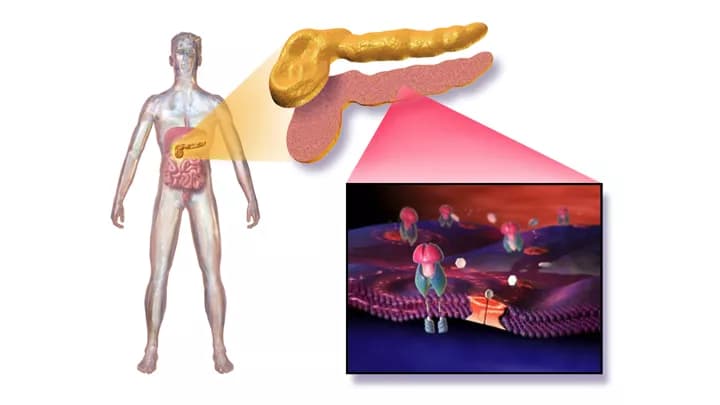
A Step Closer To A Cure For Adult-Onset Diabetes
In healthy people, exosomes -- tiny structures secreted by cells to allow intercellular communication -- prevent clumping of the protein that leads to type 2 diabetes. Exosomes in patients with the disease don't have the same ability. This discovery by a research collaboration between Chalmers University of Technology and Astrazeneca takes us a step closer to a cure for type 2 diabetes.
Proteins are the body's workhorses, carrying out all the tasks in our cells. A protein is a long chain of amino acids that must be folded into a specific three-dimensional structure to work. Sometimes, however, they behave incorrectly and aggregate -- clump together -- into long fibres called amyloids, which can cause diseases. It was previously known that type 2 diabetes is caused by a protein aggregating in the pancreas.
"What we've found is that exosomes secreted by the cells in the pancreas stop that process in healthy people and protect them from type 2 diabetes, while the exosomes of diabetes patients do not," says Professor Pernilla Wittung Stafshede, who headed the study whose results were recently published in the Proceedings of the National Academy of Sciences, PNAS.
What we know now is that "healthy" exosomes bind the protein that causes diabetes on the outside, preventing it from aggregating; however, the results do not explain why. We also don't know if type 2 diabetes is caused by "sick" exosomes or if the disease itself causes them to malfunction.
"The next step is to make controlled models of the exosomes, whose membranes contain lipids and proteins, to understand exactly what component affects the diabetes protein. If we can find which lipid or protein in the exosome membrane leads to that effect, and can work out the mechanism, then we'll have a good target for development of treatment for type 2 diabetes."
The study is actually a part of industrial doctoral student Diana Ribeiro's thesis work, and a collaboration between Chalmers and Astrazeneca.
"She came up with the idea for the project herself," says Wittung Stafshede, who is also Ribeiro's academic advisor at Chalmers. "She had done some research on exosomes before and I had read a bit about their potential. It's a fairly new and unexplored field, and honestly I didn't think the experiments would work. Diana had access to pancreatic cells through Astrazeneca -- something we'd never had access to before -- and she conducted the studies very thoroughly, and this led us to our discovery."
Materials provided by Chalmers University of Technology. Note: Content may be edited for style and length.
Disclaimer: DoveMed is not responsible for the accuracy of the adapted version of news releases posted to DoveMed by contributing universities and institutions.
References:
Diana Ribeiro, Istvan Horvath, Nikki Heath, Ryan Hicks, Anna Forslöw, Pernilla Wittung-Stafshede. (2017). Extracellular vesicles from human pancreatic islets suppress human islet amyloid polypeptide amyloid formation. Proceedings of the National Academy of Sciences. DOI: 10.1073/pnas.1711389114
Related Articles
Test Your Knowledge
Asked by users
Related Centers
Related Specialties
Related Physicians
Related Procedures
Related Resources
Join DoveHubs
and connect with fellow professionals

0 Comments
Please log in to post a comment.